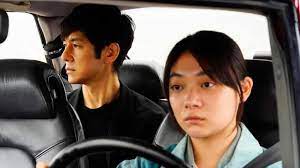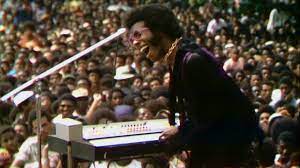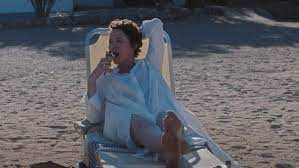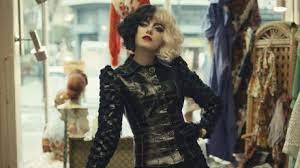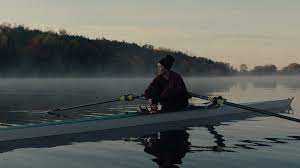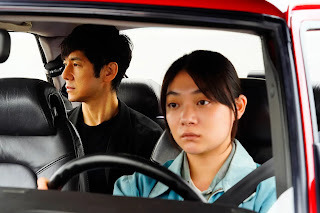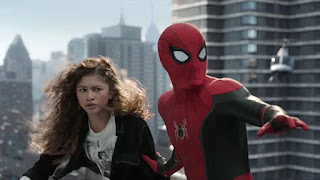Some characters never vanish. Consider Cyrano de Bergerac. The witty, eloquent outsider has been pining for Roxanne since Edmond Rostand's play debuted in 1897.
Rocky Mountain Movies & Denver Movie Review
FOR MOVIE LOVERS WHO AREN'T EASILY SWEPT AWAY
Wednesday, December 29, 2021
Dinklage gives 'Cyrano' wit, heart, and bite
Some characters never vanish. Consider Cyrano de Bergerac. The witty, eloquent outsider has been pining for Roxanne since Edmond Rostand's play debuted in 1897.
Friday, December 24, 2021
My 10 best movies of 2021
A Swiss banker and his wife travel to Argentina in 1980. The bank's previous man in Argentina mysteriously vanished. Now, the banker wants to reassure the bank's clients that their money is safe -- which also means that their well-heeled way of living can be sustained. A terrific examination of the way a political climate of menace impacts even those living in a gated, affluent world. You very likely won't see the movie's ending coming as director Andreas Fontana deals subtly but provocatively with ethical issues.
Olivia Colman gives a compelling performance as an older professor recalling her conflicted life as a mother. Jessie Buckley energizes the movie as the younger version of Colman's character, a woman who feels most alive in work, sex, and other assertions of independence. Still, she can't shake her guilt about what she regards as her maternal failings. Maggie Gyllenhaal makes her directorial debut with this brave adaptation of an Elena Ferrante novel.
Emma Thompson and Emma Stone create sharply drawn characters in a lavishly designed production that boasts witty costumes and plenty of flair. Director Craig Gillespie gives the movie a fashion-world insiders' kick that the 1961 animated version lacked. Gillespie honors Disney's past but takes the story of 1961's 101 Dalmatians to entertaining new levels. Who’d have though it possible? Another movie about fashionistas that’s dressed for fun.
Tuesday, December 21, 2021
A stark and powerful 'Macbeth'
A writer's journey begins at a bar
Some thoughts after watching The Tender Bar, the big-screen adaptation of JR Moehringer's 2005 memoir about growing up in Manhasset, NY: I'll get to a review of the movie in a bit, but I left s preview screening with two thoughts I couldn’t shake.
Friday, December 17, 2021
Blood, sweat -- but no tears for her
If you believe that the best and brightest of today's youth have been trained for ruthless competition in a world of diminishing resources, The Novice may have a particular resonance for you.
Thursday, December 16, 2021
Theater, life -- and the things not said
Movies can be driven as much by what's not said as by the words characters speak. That's true of Drive My Car, a complex, challenging movie from Japanese director Ryusuke Hamaguchi.
A slow and overlong 'Nightmare Alley'
It’s no surprise that director Guillermo del Toro has remade Nightmare Alley, a 1947 noir movie starring Tyrone Power in a role intended to challenge the actor's glamor-boy image.
Wednesday, December 15, 2021
A haunting, complex look at motherhood
'Spider-Man' takes a big step forward
Swan Song sings an edgeless tune
In Swan Song, Mahershala Ali plays a dying man who has been given the opportunity to be replaced by a clone. If Ali's Cameron opts for cloning, his wife (Naomi Harris) and young son (Dax Rey) won't know that he passed away. For them, life will continue seamlessly.
Monday, December 13, 2021
27th Annual Critics Choice Awards Nominees
BEST PICTURE
Belfast
CODA
Don’t Look Up
Dune
King Richard
Licorice Pizza
Nightmare Alley
The Power of the Dog
tick, tick…Boom!
West Side Story
BEST ACTOR
Nicolas Cage – Pig
Benedict Cumberbatch – The Power of the Dog
Peter Dinklage – Cyrano
Andrew Garfield – tick, tick…Boom!
Will Smith – King Richard
Denzel Washington – The Tragedy of Macbeth
BEST ACTRESS
Jessica Chastain – The Eyes of Tammy Faye
Olivia Colman – The Lost Daughter
Lady Gaga – House of Gucci
Alana Haim – Licorice Pizza
Nicole Kidman – Being the Ricardos
Kristen Stewart – Spencer
BEST SUPPORTING ACTOR
Jamie Dornan – Belfast
Ciarán Hinds – Belfast
Troy Kotsur – CODA
Jared Leto – House of Gucci
J.K. Simmons – Being the Ricardos
Kodi Smit-McPhee – The Power of the Dog
BEST SUPPORTING ACTRESS
Caitríona Balfe – Belfast
Ariana DeBose – West Side Story
Ann Dowd – Mass
Kirsten Dunst – The Power of the Dog
Aunjanue Ellis – King Richard
Rita Moreno – West Side Story
BEST YOUNG ACTOR/ACTRESS
Jude Hill – Belfast
Cooper Hoffman – Licorice Pizza
Emilia Jones – CODA
Woody Norman – C’mon C’mon
Saniyya Sidney – King Richard
Rachel Zegler – West Side Story
BEST ACTING ENSEMBLE
Belfast
Don’t Look Up
The Harder They Fall
Licorice Pizza
The Power of the Dog
West Side Story
BEST DIRECTOR
Paul Thomas Anderson – Licorice Pizza
Kenneth Branagh – Belfast
Jane Campion – The Power of the Dog
Guillermo del Toro – Nightmare Alley
Steven Spielberg – West Side Story
Denis Villeneuve – Dune
BEST ORIGINAL SCREENPLAY
Paul Thomas Anderson – Licorice Pizza
Zach Baylin – King Richard
Kenneth Branagh – Belfast
Adam McKay, David Sirota – Don’t Look Up
Aaron Sorkin – Being the Ricardos
BEST ADAPTED SCREENPLAY
Jane Campion – The Power of the Dog
Maggie Gyllenhaal – The Lost Daughter
Siân Heder – CODA
Tony Kushner – West Side Story
Jon Spaihts, Denis Villeneuve, Eric Roth – Dune
BEST CINEMATOGRAPHY
Bruno Delbonnel – The Tragedy of Macbeth
Greig Fraser – Dune
Janusz Kaminski – West Side Story
Dan Laustsen – Nightmare Alley
Ari Wegner – The Power of the Dog
Haris Zambarloukos – Belfast
BEST PRODUCTION DESIGN
Jim Clay, Claire Nia Richards – Belfast
Tamara Deverell, Shane Vieau – Nightmare Alley
Adam Stockhausen, Rena DeAngelo – The French Dispatch
Adam Stockhausen, Rena DeAngelo – West Side Story
Patrice Vermette, Zsuzsanna Sipos – Dune
BEST EDITING
Sarah Broshar and Michael Kahn – West Side Story
Úna Ní Dhonghaíle – Belfast
Andy Jurgensen – Licorice Pizza
Peter Sciberras – The Power of the Dog
Joe Walker – Dune
BEST COSTUME DESIGN
Jenny Beavan – Cruella
Luis Sequeira – Nightmare Alley
Paul Tazewell – West Side Story
Jacqueline West, Robert Morgan – Dune
Janty Yates – House of Gucci
BEST HAIR AND MAKEUP
Cruella
Dune
The Eyes of Tammy Faye
House of Gucci
Nightmare Alley
BEST VISUAL EFFECTS
Dune
The Matrix Resurrections
Nightmare Alley
No Time to Die
Shang-Chi and the Legend of the Ten Rings
BEST COMEDY
Barb & Star Go to Vista Del Mar
Don’t Look Up
Free Guy
The French Dispatch
Licorice Pizza
BEST ANIMATED FEATURE
Encanto
Flee
Luca
The Mitchells vs the Machines
Raya and the Last Dragon
BEST FOREIGN LANGUAGE FILM
A Hero
Drive My Car
Flee
The Hand of God
The Worst Person in the World
BEST SONG
Be Alive – King Richard
Dos Oruguitas – Encanto
Guns Go Bang – The Harder They Fall
Just Look Up – Don’t Look Up
No Time to Die – No Time to Die
BEST SCORE
Nicholas Britell – Don’t Look Up
Jonny Greenwood – The Power of the Dog
Jonny Greenwood – Spencer
Nathan Johnson – Nightmare Alley
Hans Zimmer – Dune
Friday, December 10, 2021
A fading porn star returns to Texas
Director Sean Baker has made movies that explore parts of American life Hollywood usually neglects.


